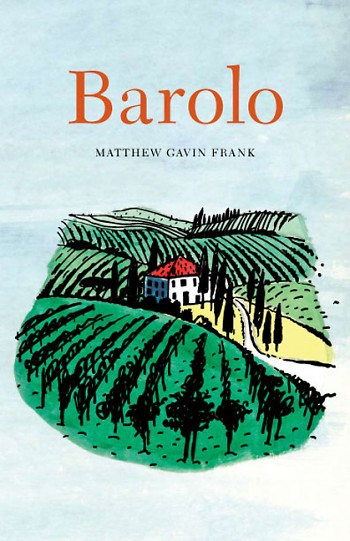I recently sat down with Author Matthew Gavin Frank to talk about the nature of prose versus verse and his new book "Barolo" released by The University of Nebraska Press. "Barolo" is part travel anthology, part foodie digest, and part cultural exploits retelling of his experience working in the agricultural and food industry in Barolo, Italy. The first draft of the book was written on a picnic table at campground by the Hondo River outside of Taos, New Mexico. Frank and his wife spent several months at the campground while working food service jobs in Taos. After a few more moves zigzagging around the Unites states from Arizona to upstate New York, he landed in Grand Rapids in 2008 as a visiting faculty teaching Creative Writing at GVSU. A poet by nature and preference, he published a collection of his poetry, "Sagittarius Agitprop" in 2009 through the Black Lawrence Press. His new work, "Barolo," explores his connection and changing experience with food.
Frank's culinary journey started with humble beginnings working as a dishwasher at the age of twelve at a local fried chicken joint in his native Chicago. He recalls childhood food memories with terms like hate, microwaved, rubbery, and suspicious. Not a foodie at birth or by early training Frank's love and understanding of food blossomed as he traveled working the food industry in the United States and eventually abroad. As I talk with him his energy changes and lifts as he begins to speak about the time he made a "revisionist caprese salad - with a basil ice cream base, a topping made from fresh mozzarella, and finished with tomato rock candy," while running his own catering business in Alaska. After a few years living in Juneau working at the Channel Bowl Cafe, a breakfast joint adjacent to a bowling alley, and then running his own catering business he headed for Italy.
His experience as an illegal worker in Barolo, Italy included working, "in the vineyards picking grapes, in the cantinas mopping floors, apprenticed in restaurant kitchens, bakeries, butcher shops," provide the fodder for his new book sharing the name of the town. When asked about the nature of travel writing and what he presents in "Barolo" Frank replied with an adamant, "I will not subject readers to diary." He is interested in engaging travel writing in a new way, as a "lyrical essay" instead of the recent trend of personal journaling as travel writing. The personal journaling model is based upon the author telling his/her own story versus telling the story of the place.
Wondering onto the topic of prose and verse in relation to audience Frank sees that "prose garners a larger audience as it connects at the page." He continued that," prose offers a "known' effect" that readers find more accessible on the written page whereas "poetry deals with the unknown, the weird unnameable shit." Frank finds that poetry is a more active engagement with ideas and images that seems to become more accesible to an audience in the realm of performance. Frank contends that "the best poetry should provoke/evoke" and is often a set of "seemingly dissimilar images that you are engaged with, to make sense of, to see the connections between, for the reader to empathise with." Where reading prose is a passive state framed by conventions of storytelling poetry is an active entity that requires you to interpret and form meanings.
Frank has an active schedule of readings and continues to write, a new book of poetry coming out later this summer based upon travels in his wife's native land South Africa. He is also working on a new travel tale based on a journey to Oaxaca, Mexico. Outside of his national touring he also has two local readings schedueled - May 4 at
Schuler Books and Music - 28th St. at 7pm and May 20 at
Literary Life Bookstore at 7pm, both stores also carry his work.
Disclosure: Frank and Rumsey are neighbors in East Hills.
The Rapidian, a program of the 501(c)3 nonprofit Community Media Center, relies on the community’s support to help cover the cost of training reporters and publishing content.
We need your help.
If each of our readers and content creators who values this community platform help support its creation and maintenance, The Rapidian can continue to educate and facilitate a conversation around issues for years to come.
Please support The Rapidian and make a contribution today.


